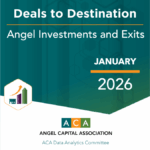

In this newsletter:
- 2024 Political Outlook & Public Policy at the Summit of Angel Investing
- The Accredited Investor Alliance
- An interview with Anya Coverman, President and CEO, Institute for Portfolio Alternatives (IPA)
- Taking Action: Lend Your Voice
2024 Political Outlook
With less than five months to go before a pivotal 2024 election, ACA’s Summit of Angel Investing was a perfect time to delve into the election’s implications on the angel community. During May’s summit, ACA lobbyists Chris McCannell and Blair Hancock provided their expertise on how the election could impact ACA. Here is a deeper dive into what was discussed at the Summit.
With the Presidency and control of the House and Senate all up for grabs in November, the US political landscape could complete shift in 2025. All three races are equally hard to predict.
The 2024 Presidential race will be a 2020 rematch. Right now, President Joe Biden and Former President Donald Trump each have a viable path to the 270 electoral college votes needed to secure the presidency. According to the most recent polling data from Inside Elections, Arizona, Georgia, Michigan, Nevada, Pennsylvania and Wisconsin are all toss up states. These 77 electoral votes will determine the Presidency. Nevada was recently changed from “Tilt Democratic” to toss-up. All the current toss-up states were won by President Biden in 2020. Their toss-up status six months before the election signifies that although this is a rematch, repeat success for President Biden in battleground states is far from certain, and the way the election map shakes out this time could be very different. This US Senate election cycle favors Republicans.
The Senate Race
Of the 34 Senate elections, 23 of the seats are currently held by Democrats, including two Independents who caucus with Democrats. The West Virigina Senate seat currently held by Democrat turned Independent Joe Manchin is all but guaranteed to flip Republican as Sen. Manchin is not running for reelection. Sen. Jon Tester from Montana, Sen. Jackie Rosen from Nevada, and Sen. Sherrod Brown from Ohio, are all Democrat incumbents whose races are currently toss-ups. Brown and Tester are attempting to hold onto their seats in states Trump won in 2020. The only two Republican Senate seats that are even somewhat contested are Sen. Scott of Florida and Sen. Cruz of Texas. With Democrats currently holding a two-seat majority in the Senate, the four Democrat seats up for grabs in solidly Republican or toss-up states will go a long way in determining control of Congress’s upper chamber.
The House of Representatives
With all 435 seats in the House of Representatives up for grabs combined with the Republican’s current five seat majority, the House’s majority for next Congress will hinge on several highly competitive races. It is important to note that as of April 44 Representatives have either retired during this Congress or announced they are not running for reelection. This includes the House Financial Services Chair Patrick McHenry from North Carolina, House Energy and Commerce Committee Chair Cathy McMorris Rodgers and key Democratic House Financial Services member Wiley Nickel from North Carolina.
There are currently 187 House races that favor Republicans, 174 that favor Democrats and 74 competitive races.
ACA Ambassadors
No matter who wins, there will be new stakeholders to educate. The ACA public policy committee has created an ambassador program to help educate new and old members on our priority issues. Educating candidates and future members of Congress when they return to their states and districts will pay dividends for future ACA engagement in Washington. Decades of political experience have taught us that relationships built during the campaign season are the most enduring.
Regardless of the outcome of the elections, ACA will continue advocating for the industry’s top policy priorities. These include preserving and expanding QSBS treatment in Sec 1202, restoring 100% immediate expensing for research and development costs, raising fund limits and permitting additional measures of sophistication to the accredited investor definition.
ACA Joins the Accredited Investor Alliance
ACA is continuously looking to broaden its reach in the angel community and join other institutions in advocating for the most pressing issues affecting the industry. With this in mind, ACA recently joined the Accredited Investor Alliance. The Accredited Investor Alliance (AIA) aims to serve as the nationally recognized voice on issues affecting accredited investors. The mission is to represent a diverse range of stakeholders before the White House, relevant agencies and Congress. AIA is committed to expanding the pool of accredited investors while preserving appropriate investor protections.
Alliance members come from across the country, representing both urban and rural areas, which highlights the alliance’s commitment to democratizing access to investment opportunities, fostering capital formation and ensuring that a broader demographic can partake in the financial growth and innovation throughout the country. One of the AIA’s main goals is to advocate for a detailed and multifaceted examination of the accredited investor definition by the SEC and Congress. The goal is to revise and broaden the accreditation criteria to encompass an in-depth analysis and investment returns and outcomes from the private markets, the addition of new diverse qualification methods, and a thorough assessment of how potential inflation adjustments could affect both current and prospective accredited investors.
Currently, there are a few dozen organizations similar to ACA in AIA. One of these partners is the Institute for Portfolio Alternatives (IPA). IPA raises awareness of alternative investment products among stakeholders and market participants. They are committed to ensuring that all investors have access to real assets and the opportunity to diversity their investment portfolios with alternative products. IPA membership includes product sponsors of private real estate, private credit and other real assets, financial intermediaries and industry service providers.
An interview with Anya Coverman
As an introduction to the AIA, ACA conducted an interview with Anya Coverman, IPA’s President and CEO, to discuss the new alliance, how ACA and IPA are working in tandem to address the accredited investor definition and their shared goals for the industry.
This interview was edited for brevity and clarity.
ACA: What initiated the partnership between IPA and ACA and the rest of the coalition?
Coverman: The SEC is preparing to examine and redefine its accredited investor decision and it is crucial that we inform the debate that is about to begin. Here is a summary of what is happening:
This past December, the SEC issued its mandatory four-year staff report on the accredited investor definition that included language signaling the SEC’s concern with the current pool of accredited investors and the likelihood it would move to significantly narrow the definition by excluding retirement accounts and making other inflation adjustments.
The SEC’s most recent regulatory agenda also includes a planned proposal to amend Regulation D, including redefining accredited investor status.
In light of this, the IPA has formed the first-ever industry-led “Accredited Investor Alliance,” a coalition of industry partners who are coming together to collaborate on the common mission of not only opposing any reform that would narrow the definition but working meaningfully to expand it while preserving appropriate investor protections.
The overarching goal of the coalition is to ensure that a broader demographic can participate in our country’s financial growth and innovation, by broadening the pool of investors who can access alternative investments. The IPA is excited to partner closely with the ACA and others, given the importance of this issue to our respective members.
ACA: What are the benefits of partnering with the ACA?
Coverman: The IPA and ACA share the common mission of encouraging our regulatory authorities to recognize the growing significance of the private markets in today’s diverse economy and capital markets, both for early-stage and established companies.
We collectively advocate for policy reforms to broaden investor access to these valuable investment opportunities. We look forward to engaging in this partnership together, leveraging resources and expertise to collaborate on common policy and member concerns.
ACA: How are you working together on the accredited investor definition? How will being part of this coalition help? Was progress on reforming the accredited investor definition stalled prior to the coalition’s inception?
Coverman: The SEC has only substantively amended the accredited investor definition four times since the adoption of Regulation D more than 40 years ago. Given the recent SEC staff report on the accredited investor definition and the fact that it continues to be listed on the SEC’s short term rulemaking agenda, our coalition is poised to have a front and center voice in any potential changes. This is the first time that diverse organizations have presented such a unified voice on this critical issue.
ACA: What does coalition success look like to you?
Coverman: We are bringing an intense and single-minded focus to this critical issue. The SEC’s changes could be highly consequential for alternative funds and their investors. We will be urging the SEC to revise and broaden the accreditation criteria, beginning with three steps. First, conduct an in-depth analysis of investment returns and outcomes from the private markets. Second, add new diverse qualification methods. Third, thoroughly assess how potential inflation adjustments could affect both current and prospective accredited investors.
Additionally, the coalition stands against any narrowing of the definition that would disqualify existing accredited investors or introduce new restrictions, such as omitting retirement plans from qualification criteria. The aim should be to forge an inclusive, expansive and adaptable framework that moves beyond the overly simplistic “income and net worth” monetary thresholds.
Join the ACA Public Policy Committee - Lend Your Voice
ACA believes in the impact and benefits of angel investing to entrepreneurs, job growth and the economy. Deeply active on the federal legislative and regulatory fronts, ACA helps safeguard and galvanize the rights of American angel investors so that we can protect the foundation that fuels the startup economy. ACA represents our members, but we invite investors to lend their efforts – a combined voice matters. Reach out to us to talk about joining the ACA Public Policy committee!






